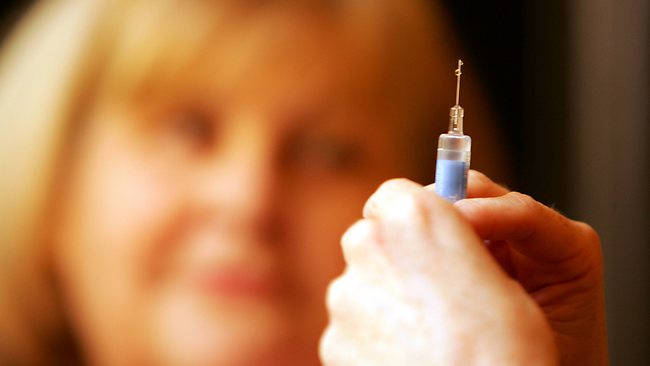Children face risks in pockets of resistance to vaccination
PARENTS refusing to immunise their children are turning some of the state's most desirable locations into ticking timebombs for disease.
PARENTS refusing to immunise their children are turning some of the state's most desirable locations into ticking timebombs for disease.
The Blue Mountains, Byron Bay and towns along the south coast are among the worst, due largely to "conscientious objectors" ignoring public health messages.
Australian Academy of Science president Professor Suzanne Cory said the proportion of parents registering objections had increased 600 per cent since 1999 - to "worrying levels".
Immunisation against potentially fatal diseases such as whooping cough had dropped below 50 per cent in some areas, well beneath what health authorities consider safe.
Residents in those communities are paying the price. Health data reveals a direct correlation between the proportion of people immunised and the number falling ill.
Are you for or against immunising children against disease? Tell us below
Doctors recorded almost 500 cases of whooping cough between the Tweed and Clarence rivers last year, well above the state's average.
The north coast town of Ballina, which has high rates of vaccination, recorded low rates of diseases such as measles.
Byron Bay, 30 minutes away, has some of the state's worst rates of immunisation, and highest rates of disease. The region is also home to one of the largest anti-vaccination advocacy groups, the Australian Vaccination Network.
National Centre for Immunisation Research and Surveillance director Professor Peter McIntyre said, while NSW had a high infant immunisation rate, there were "clusters of people with alternative views on health and lifestyle".
"Refusing immunisation is like playing Russian roulette with your child," he said.
"You can have kids who get mild measles or whooping cough and just shrug it off - but there's no guarantee."
NSW Health director of health protection Jeremy McAnulty said the proportion of people who conscientiously objected to immunisation was "about 2 or 3 per cent".
"It's a bit of a paradox because the more successful immunisation is, the less people realise why it's so important," Dr McAnulty said.
"They don't see the outbreaks of disease that we used to see before immunisation."
The Australian Academy of Science, which launched a booklet yesterday promoting immunisation and dispelling myths about its risks, said more than 30,000 children nationwide were at risk due to objections to immunisation.



